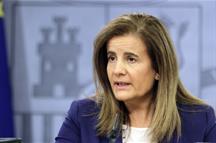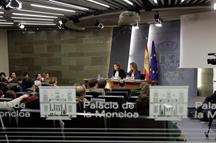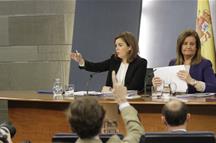Council of Ministers
Government guarantees equality of Spaniards in access to employment services, and boosts their effectiveness
Council of Ministers - 2015.1.16
Moncloa Palace, Madrid
Among the agreements reached on Friday by the Council of Ministers, the Vice-President of the Government highlighted a new regulation that comes within the framework of the "most significant cornerstone of the agenda" of this government: job creation. This is a Common Portfolio of Services under the National Employment System, that seeks "to guarantee equality in access to employment services for all workers throughout the country", commented Soraya Sáenz de Santamaría.
As a result of this Royal Decree, for the first time since the transfer of powers on this issue to the regional governments, "a common framework has been established with the measures that must be implemented by the different regional employment services", explained the Vice-President of the Government. The regional government may extend or complement this portfolio, she added.
Reduce length of unemployment
The Minister for Employment and Social Security, Fátima Báñez, asserted that in 2014 Spanish society and the government reforms "have set in motion the job machine for the first time" following seven years of crisis. "Thanks to the joint efforts of all concerned, including the regional governments and social stakeholders, more than 1,600 jobs were created each day", she pointed out.
The government is aware that "there is still a long way to go", and that the main priority is to reduce "the length of time from unemployment to employment", remarked Fátima Báñez. This is the aim of the Spanish Strategy for Job Creation implemented by the government, and the common portfolio of services presented on Friday is just one more step in that direction. "This is the silent job market reform, because we have been working with the social stakeholders and with the regional governments for a long time to make the public employment services that are available to the unemployed more effective and to assist in their return to the job market", stressed Fátima Báñez.
According to the Minister for Employment, active employment policies have not historically lacked resources: between 2008 and 2011 more than 30 billion euros were made available to them, but in this period unemployment rose by 3.3 million. Fátima Báñez also remarked that 47% of the unemployed have no contact whatsoever with their public employment office, and only 30% expect a call from this office. She pointed out that the problem is to adapt and attend to the new needs of the unemployed. To date, the public services have focused on managing benefits and subsidies, and hence it is necessary to modernise them so that they can also guide the unemployed and help them return to the job market.
Personalised attention
The minister declared that the new common portfolio of services will not only guarantee equal access to any public office throughout the country, but will also allow for "the personalised attention to be given to the unemployed to be monitored", and "to make the public resources result-based".
 Pool MoncloaIn this regard, 2015 will be the first year that 60% of the resources allocated to employment policies will be paid out to regional governments according to compliance with the goals set. Fátima Báñez stressed that the situation that arose in 2014 whereby 76% of these budgetary resources were not used "concerns" the government and will mean that "these amounts cannot be allocated in the following financial year".
Pool MoncloaIn this regard, 2015 will be the first year that 60% of the resources allocated to employment policies will be paid out to regional governments according to compliance with the goals set. Fátima Báñez stressed that the situation that arose in 2014 whereby 76% of these budgetary resources were not used "concerns" the government and will mean that "these amounts cannot be allocated in the following financial year".
Under this reform, the employment services will be focused on professional orientation, from the preparation of an individualised profile of the unemployed individual to advice on market trends. They will also perform an intermediary role with companies, in terms of training, and finally, of providing advice for the self-employed and entrepreneurs.
Fátima Báñez underlined that the government will allocate 4.76 billion euros to active employment policies in 2015, an increase of 16.8% on 2014. 43% will be allocated to training actions and 31.5% to discounts for hiring the unemployment with the greatest difficulties in returning to the job market. In addition, 260 million euros will be allocated to especially vulnerable groups and those at risk of exclusion, 251 million euros to career advice, 110 million euros to collaboration with private recruitment agencies and 100 million euros to modernising the employment services.
National Security
The Council of Ministers analysed the Draft Constitutional Law on National Security that seeks to adapt the present system to the new risks and threats to citizens. Furthermore, the new legislation provides for the existing structure to be updated to strengthen prevention and provide responses to crisis situations.
The Vice-President of the Government recalled that the text has its origin in the 2013 National Security Strategy. The Ministries of Foreign Affairs and Cooperation, Defence, Home Affairs and Presidency all participated in drafting the document, which will be submitted to the Council of State for its opinion.
 Pool MoncloaSoraya Sáenz de Santamaría explained that "the goal of the National Security System is the optimum, flexible and integrated operation of all the resources available to the State to guarantee the security and and the defence of our democratic values".
Pool MoncloaSoraya Sáenz de Santamaría explained that "the goal of the National Security System is the optimum, flexible and integrated operation of all the resources available to the State to guarantee the security and and the defence of our democratic values".
In this regard, she argued that the future constitutional law offers a comprehensive approach to national security and better coordination between public bodies and public administration services when faced with challenges such as cyber-security, the threat of terrorism, natural disasters and energy vulnerability. "The new legislation sets out the structural-institutional system and defines the powers assigned to each higher body and authority".
Situations of interest for national security
One new feature contained in the draft law is the regulation of situations of interest for national security, which covers the legal void that existed between the most serious crises, for which states of alarm, exception and siege may be adopted, and those other crises which are tackled with standard means and resources.
The Vice-President of the Government explained that the situation of interest will be adopted by the President of the Government in response to circumstances that require greater coordination, resources and attention for the matter at hand, due to their potential seriousness, but which do not result in a need to declare the constitutional states of alarm, exception or siege.
On this matter, she clarified that "under no circumstance does the adoption of a declaration of interest for national security result in the suspension of any fundamental right or public freedom".
Soraya Sáenz de Santamaría highlighted that the draft law studied on Friday completes and provides continuity "to the policies and to the National Security Strategy undertaken by the government since the start of the legislature".
Boost to Mediterranean Corridor
 Pool MoncloaThe Vice-President of the Government reported on the authorisation by the Ministry of Public Works so that, through the body ADIF Alta Velocidad, platform construction works on the Pulpí-Cuevas del Almanzora stretch of the Murcia-Almeria High-Speed Railway Line can be put out to tender. This stretch will be tendered for an amount of 86,246,456 euros, to be co-financed by the European Regional Development Fund (ERDF).
Pool MoncloaThe Vice-President of the Government reported on the authorisation by the Ministry of Public Works so that, through the body ADIF Alta Velocidad, platform construction works on the Pulpí-Cuevas del Almanzora stretch of the Murcia-Almeria High-Speed Railway Line can be put out to tender. This stretch will be tendered for an amount of 86,246,456 euros, to be co-financed by the European Regional Development Fund (ERDF).
Soraya Sáenz de Santamaría underlined that, as a result of this measure, "a very important boost is given to the Mediterranean Corridor", which affects 40% of the Spanish population and represents 49% of the total overland goods traffic in Spain.
Other agreements
The government approved the distribution criteria for 2015 for the Fund for Property Confiscated from illegal drug trafficking and other related criminal offences. The amounts comprising the fund will be allocated to stepping up actions to reduce the demand for drugs, control their supply and facilitate international cooperation on this matter, and for care for minors in an at-risk situation and for programmes focused on the problems of females with drug dependencies.
The Council of Minister also established the criteria for the proposal for the election of judges, general court attorneys and members of the various European courts. It also modified prevailing legislation on labelling issues, and the presentation and identification of certain wine products.
Current affairs
In response to questions from the media regarding the government's opinion on the new call for elections in Catalonia, the Vice-President of the Government highlighted that when "a government permanently resorts to this system" it shows that "it is incapable of governing". A decision like this one, she added, clearly shows that the President of the Regional Government of Catalonia, Artur Mas, "is trying to gain time by making the people of Catalonia lose theirs".
In view of the fact, which she described as "unheard of", of "calling elections in eight months time", she asked what the Regional Government of Catalonia will do during this time. "When three elections are called in five years", it is a clear sign "that something is amiss", she added.
 Pool MoncloaSoraya Sáenz de Santamaría declared that during these five years, "it has done nothing except announce more elections", when governments need to "be pro-active" and help "consolidate the recovery". In this regard, she stressed that the government guarantees that the people of Spain, including the people of Catalonia, will not see "their level of public services reduced due to the total inactivity of their leaders".
Pool MoncloaSoraya Sáenz de Santamaría declared that during these five years, "it has done nothing except announce more elections", when governments need to "be pro-active" and help "consolidate the recovery". In this regard, she stressed that the government guarantees that the people of Spain, including the people of Catalonia, will not see "their level of public services reduced due to the total inactivity of their leaders".
Regarding the prosecution and punishment of authors of pro-terrorism messages on the Internet and on social networks, Soraya Sáenz de Santamaría made it clear that while "freedom of expression exists, it has limits that must be respected", and hence the "recruitment, training and apologia for terrorism over the Internet should continue to be prosecuted".
The Government Spokesperson welcomed the counter-terrorism agreement reached between the President of the Government and the leader of the PSOE [Socialist Workers' Party], because "it is an affair of State" and we must "work on national and international cooperation together".
As regards the decision taken by the company Repsol to cancel the hydrocarbon explorations in the waters around the Canary Islands, Soraya Sáenz de Santamaría said that, in a country with a "major energy deficiency" such as Spain, it is "good for us to know" whether these resources exist or not. In any event, she pointed out that the decision on the sites where this exploration takes place does not correspond to the public authorities but rather to the interested companies.





.jpg?RenditionID=32)